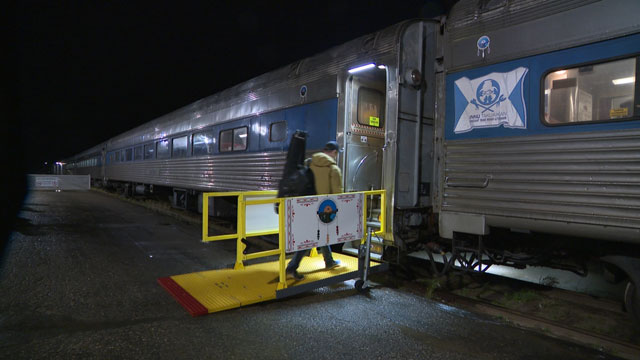Editor’s Note: Shortly after this story was posted, the two sides in the labour dispute came to an agreement. This story reflects the change in the story but still contains the comments from passengers who were inconvenienced by the strike.
Lindsay Richardson
APTN News
After six weeks of high tension, striking workers on a critical railway line finally reached an agreement with their union Wednesday evening.
The news comes just days after dozens of workers on the Tshiuetin rail line in northeastern Quebec agreed to temporarily suspend their pressure tactics.
Board Chair Sharon Shecanapish said in a statement that train service will gradually return to normal, ending weeks of stressful commuting for residents of the province’s remote communities.
The strike, and ensuing stalemate, held up operations on the 200 km line. It’s owned and jointly operated by the Innu communities of Uashat mak Mani Utenam and Matimekush-Lac-John, and the Naskapi Nation of Kawawachikamach.
For nearly 15 years, it’s served as a critical link and facilitates food and supply delivery to areas otherwise only accessible by plane.
But manpower issues during the strike forced the train to reduce its service to one round trip per week.
“A dozen workers left already because they see that the company is falling apart, little by little,” explained union President Joel Jean-Pierre.
“It’s not us workers who are causing these deficits, it’s the fault of the company’s bad management.”
Watch Lindsay’s story on the railway here:
Every Wednesday morning, long before sunrise, commuters and cargo pack the train station depot waiting to pay a $10 fare to make the 12-hour trek to Schefferville.
Because of the unavoidable setbacks, those who use the train say that life – and work – now unfortunately revolve around its schedule.
Missing the train, for example, could leave you stranded until it runs again the following week.
“What’s bothersome is when you have to go buy things in Sept-Iles,” explained passenger Derek Aster. “I lost a week of work. I won’t be paid because of what’s going on.”
Others counting on the train as transportation to traditional hunting grounds before winter say they’ve also had to make alternative arrangements.
“I had to cancel [hunting] and cancel the trip because the train no longer stops at my stations,” explained Gloria Vollant. “My cousin Gilles, he had to cancel his trips because the train schedule doesn’t coincide with his days off.”
Usurping Tshiuetin’s service also has tangible consequences for the regional economy. Tata Steel, a company using the railway to transport mining equipment, experienced delays and unmoved product – reportedly causing substantial losses.
Those in far-flung communities fear their much-needed deliveries of food and petrol will not be enough to subsist on if only delivered once a week for the rest of the winter.
The group of over 60 workers demanding better pay and a pension plan moving forward. Jean-Pierre, for his part, has also voiced concerns over the modernity of company resources.
Outdated trains are often breaking down, he says, causing service delays even before the strike began in late September.
“That’s another problem,” Jean-Pierre explained. “That Transport Canada has to look at and work with our material, which isn’t necessarily up to date.”
During the strike, workers sought improvements in work hours and wages, and asked for a pension plan.
The terms of the agreement are unknown.
@sentimtl
With files from Sylvie Ambroise.











